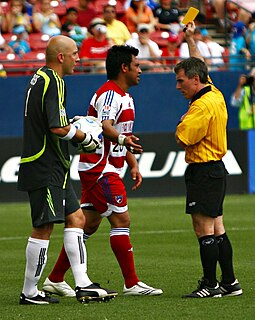In the 2011 FIFA Beach Soccer World Cup the main disciplinary action taken against players comes in the form of red and yellow cards.

The 2011 FIFA Beach Soccer World Cup was the sixth edition of the FIFA Beach Soccer World Cup, governed by FIFA. Previous editions before 2005 were not governed by FIFA and were held under the title Beach Soccer World Championships. Overall this was the 16th edition of the World Cup since its establishment in 1995. It took place at the Stadio del Mare, a temporary stadium at the Marina di Ravenna in Ravenna, Italy, the third tournament to take place outside Brazil, which started on September 1 and ended on September 11, 2011. However this was the first tournament to take place under the new two year basis; now the FIFA Beach Soccer World Cup takes place once every two years. The tournament was confirmed in March 2010. Brazil were the defending champions, after winning their fourth FIFA Beach Soccer World Cup title in 2009. The tournament was won by Russia, winning their first title in their first final after beating Brazil.

Penalty cards are used in many sports as a means of warning, reprimanding or penalising a player, coach or team official. Penalty cards are most commonly used by referees or umpires to indicate that a player has committed an offense. The official will hold the card above his or her head while looking or pointing towards the player that has committed the offence. This action makes the decision clear to all players, as well as spectators and other officials in a manner that is language-neutral. The colour or shape of the card used by the official indicates the type or seriousness of the offence and the level of punishment that is to be applied. Yellow and red cards are the most common, typically indicating, respectively, cautions and dismissals.
Contents
Any player picking up a red card is expelled from the pitch and automatically banned for his country's next match, whether via a straight red or second yellow.